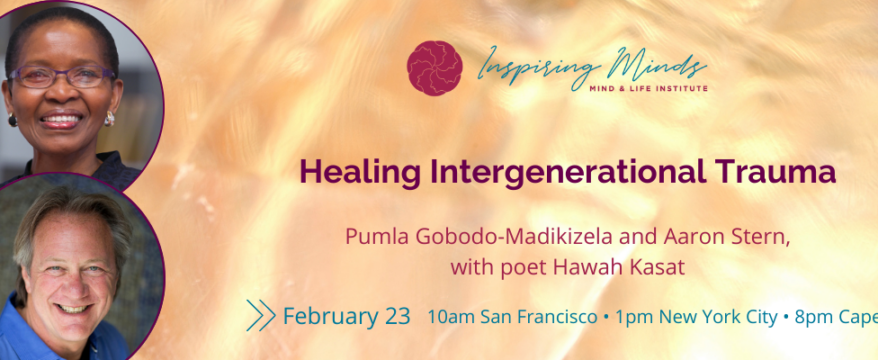Reflecting on Inspiring Minds
Last week, Academy Founder and President Aaron Stern joined Pumla Gobodo-Madikizela and Hawah Kasat for Mind & Life’s Inspiring Minds conversation on Healing Intergenerational Trauma. Together, they shared reflections, learnings, and stories focused on two learning questions:
- How do we create safe spaces where intergenerational healing can take place, rooted in an understanding of our interconnection?
- What is the role of wisdom traditions, storytelling, and the arts in building resilience and leadership skills among today’s youth?
Themes of activating societal repair through relationships, cultivating a shared sense of belonging, remembering the power of love and creativity, and navigating trauma through engaged awareness emerged. We invite you to join us in reflection and learning by watching the conversation and reviewing the conversation highlights below.
Revisit the Inspiring Minds conversation
Conversation Highlights
- Pumla on repairing trauma: “What is left for us in the face of this [historical and societal trauma]? What is left is relationships. That is not all. There should be recognition that something needs to shift, something needs to change. What needs to change is this: We need to join hands in fighting for social justice, so that the lives of the descendents from whom something was taken can be different. Under the present circumstances, it is a repetition of disempowerment, racism, poverty, and loss upon loss that strips people of their sense of dignity. What remains is the power of solidarity and being able to connect with the other and fight for social justice, because that is what remains.”
- Aaron on processing trauma: “What I know to do best now, in this moment, is to experience the impact [of trauma] and keep noticing what is happening and unraveling in me, and not run from it. Actually become vulnerable to it and continue to open. Because I think underneath, the very basis of all of us, is a deep heart. We can’t walk past trauma. We can’t walk past the horrors and atrocities…We must experience them. They live in our bodies. If we can continue to deepen contact with what we are experiencing in our bodies and not flee from it, but grow the capacity to stay present and be in relationship with others, relationships will help us find our way. Nobody has an answer. Being here is what’s important – moment, by moment, by moment.”
- Aaron on love as a form of repair: “Experience the power of learning and the unraveling and repair that makes it possible for the deeper levels of love, love that live in all of us, to activate and manifest in the world – and then heal.”
- Pumla on love as a form of repair: “We underestimate this word, love. And yet, we are born to love. It is something that exists in us. We underestimate its power in our lives… When you repair, the cracks [of the past and trauma] will always be there. But we wake up everyday and want to repair, engage, be the change, and build empathic spaces, where these possibilities of connecting with the other, as an act of repair, will emerge.”
- Hawah on art and social justice as a form of repair and creating new futures: “Music and art has also been the anchor, pulse, and heartbeat of every social justice movement in the world. The beauty of art and the creation of art is such a central part of us shaping and shifting and building a new cultural consciousness. Art and music is the bridge, and we need to meet the young people where they are. This is how we create this culture of peace and compassion: by helping young people tap into their voices.”
- Aaron on learning as a form of repair and creating new futures: “I look forward to a time when the deeper hearts of young people can be expressed through the experiences they have in learning. We have to make sure to remember that as they are inside these [education] systems, the systems have a different agenda. The industrialized mindset of education, for competition instead of collaboration, distances young people from bringing forth the belonging of their hearts, and what they actually want to do in the world. It’s important to create spaces for that to happen for young people.”


